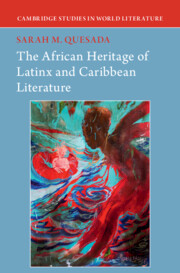Book contents
- The African Heritage of Latinx and Caribbean Literature
- Cambridge Studies in World Literature
- The African Heritage of Latinx and Caribbean Literature
- Copyright page
- Contents
- Illustrations
- Acknowledgments
- Introduction Textual Memorials of a Latin-African Literature
- Chapter 1 Fear
- Chapter 2 Commodification
- Chapter 3 Obliteration
- Chapter 4 Archival Distortion
- Coda
- Notes
- Bibliography
- Index
Chapter 2 - Commodification
Black Internationalism and the African Safari of Achy Obejas’s Ruins
Published online by Cambridge University Press: 14 July 2022
- The African Heritage of Latinx and Caribbean Literature
- Cambridge Studies in World Literature
- The African Heritage of Latinx and Caribbean Literature
- Copyright page
- Contents
- Illustrations
- Acknowledgments
- Introduction Textual Memorials of a Latin-African Literature
- Chapter 1 Fear
- Chapter 2 Commodification
- Chapter 3 Obliteration
- Chapter 4 Archival Distortion
- Coda
- Notes
- Bibliography
- Index
Summary
This chapter looks back at the aftermath of Cuban Black internationalism in Angola, before Cuba’s dire economic depression of the 1990s, termed “the Special Period in Times of Peace.” In this earlier neoliberal era, Ruins is set when Cuba opened its doors to tourism for the first time in fifty years. But amidst economic despair in Havana, the main protagonist takes refuge in his imagined African utopia constructed from a glorification of the Angolan war, to Ernest Hemingway’s safari, to imageries of modernism in Pablo Picasso and Wifredo Lam, to even African heritage tourism. Yet this African safari often includes Badagry, Nigeria along the Slave Route. As I reveal the ways in which Nigerian writers Wole Soyinka and Pius Adesanmi bemoan Badagry’s neoliberal developmentalism, so does Obejas in her novel, as Ruins sets up a comparison by which African commodification as much in Havana as in Badagry leads to Africa’s excision from Cuban identity. As the tourism industry threatens to turn the Revolutionary protagonist toward capitalism despite his fervent Black internationalism, the novel suggests that a genuine Latin-African historicism might rehabilitate his commodified African safari.
- Type
- Chapter
- Information
- The African Heritage of Latinx and Caribbean Literature , pp. 76 - 116Publisher: Cambridge University PressPrint publication year: 2022

